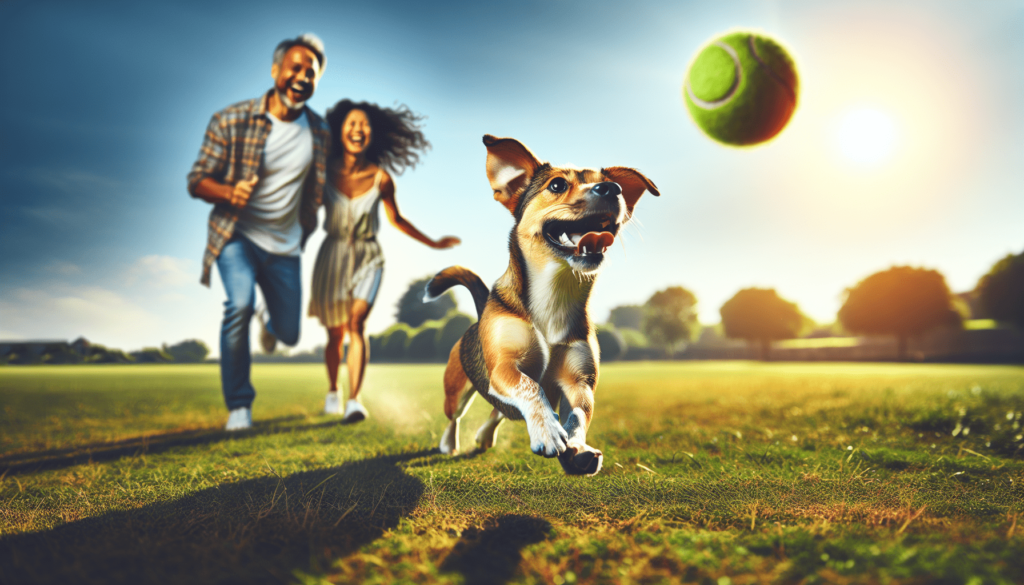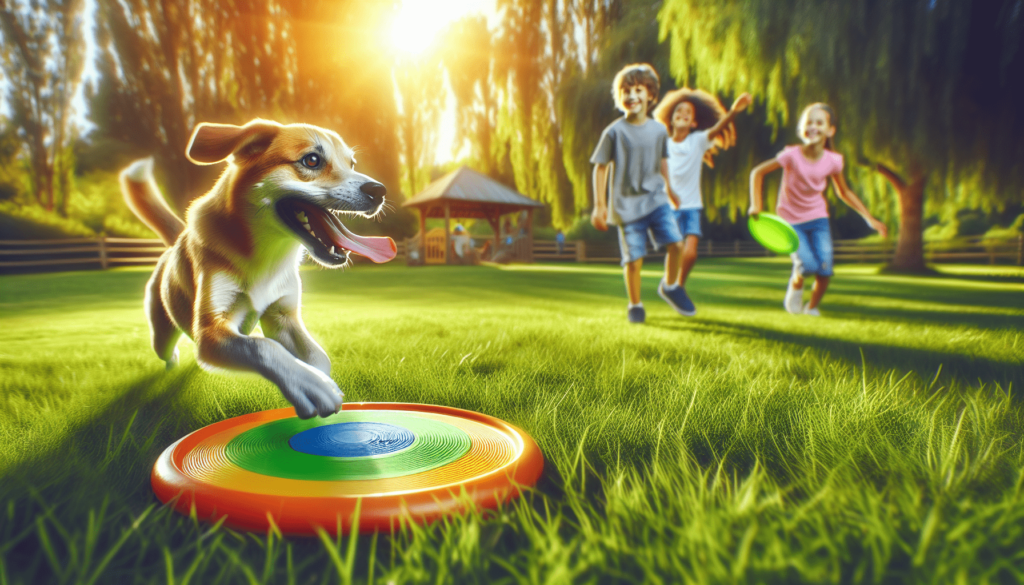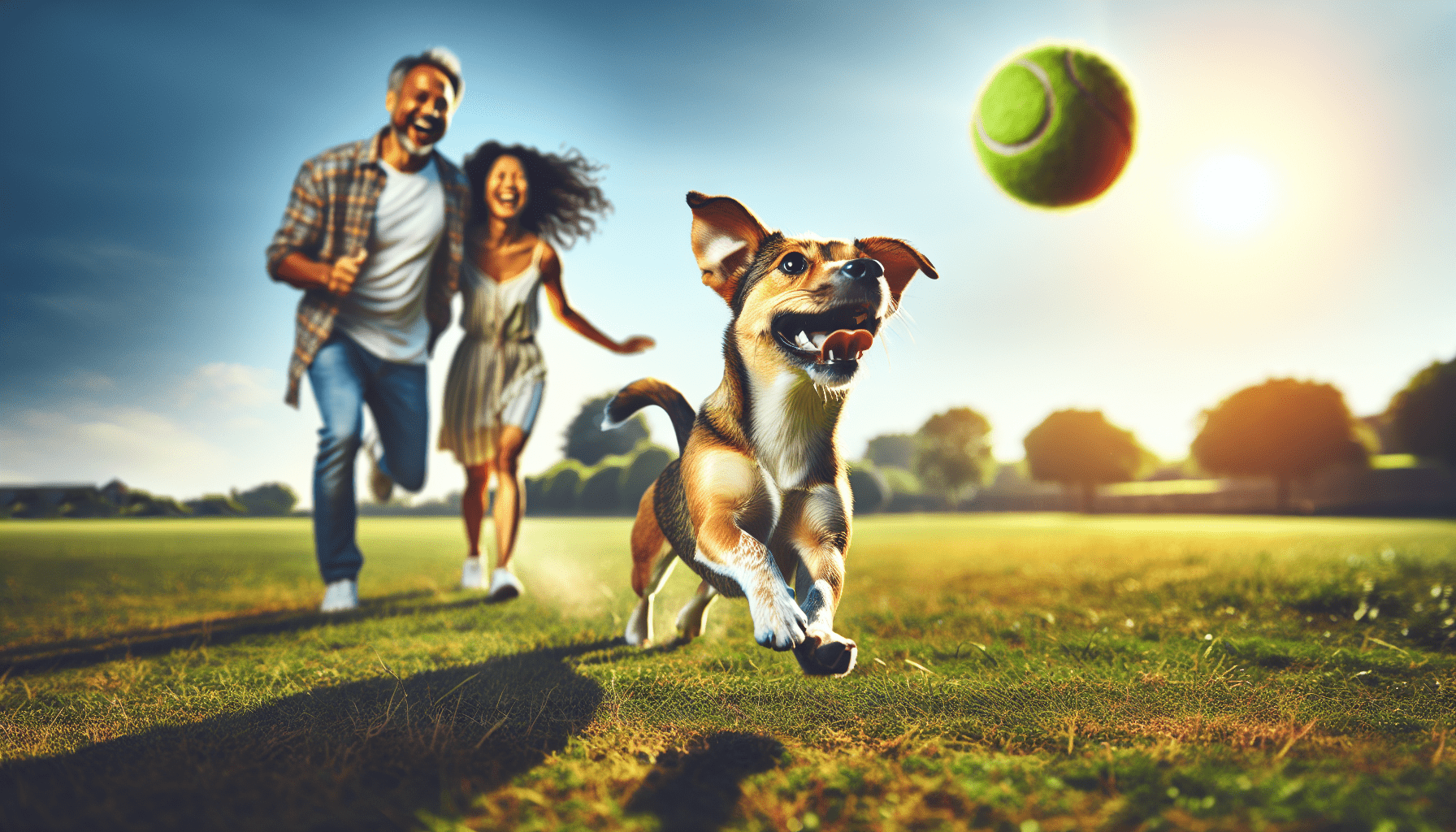Imagine a world where joy is at the forefront of every moment, and living in the present is the ultimate goal. This world is not imaginary for our furry friends, as their lives are a constant reminder of the importance of play. In the captivating article “The Importance of Play in a Dog’s Life,” you will uncover the myriad of reasons why play is not just a frivolous activity, but an essential component of a dog’s overall well-being. So fasten your seatbelt, grab a toy, and get ready to explore the magical world of play from a dog’s perspective.

Physical Exercise
Physical exercise is crucial for a dog’s overall health and fitness. Regular exercise helps dogs maintain a healthy weight, which is essential for their overall well-being. Engaging in physical activity can help prevent obesity, which is a significant concern for many dogs. By participating in activities such as walking, running, playing fetch, or going for a swim, dogs can burn calories and maintain a healthy weight.
In addition to weight management, physical exercise also plays a significant role in improving cardiovascular health. Just like humans, dogs need to maintain a healthy heart and strong muscles. Regular exercise helps strengthen their cardiovascular system, improving blood circulation and overall heart health. By engaging in activities that increase their heart rate, such as running or playing vigorously, dogs can have healthier hearts and better overall fitness.
Mental Stimulation
Playtime and physical exercise not only benefit a dog’s body but also their mind. Dogs need mental stimulation to prevent boredom and destructive behavior. Engaging in playtime activities, such as puzzle toys or interactive games, helps keep their minds stimulated and prevents them from getting bored or engaging in destructive behaviors like excessive chewing or digging.
Furthermore, playtime and physical activity enhance problem-solving abilities. Through interactive games and training exercises, dogs learn to solve problems and overcome challenges, which sharpens their cognitive skills. These activities also promote cognitive development, allowing dogs to learn new commands, tricks, and tasks. Mental stimulation through playtime can keep a dog’s mind sharp and alert, enhancing their overall intelligence and problem-solving abilities.
Bonding and Socialization
Playtime and physical exercise provide an excellent opportunity for bonding between a dog and their owner. Engaging in activities together, such as playing fetch, going for a run, or participating in agility training, strengthens the bond and trust between you and your dog. It creates a positive and enjoyable experience that deepens the connection and mutual understanding.
Moreover, playtime facilitates social interaction with other dogs. Dogs are naturally social animals, and engaging in play with fellow canines allows them to develop important social skills. By meeting and playing with other dogs, they learn how to communicate, share, and understand each other’s body language. This social interaction helps reduce aggression and fearfulness, promoting a more confident and well-adjusted dog.
Stress Reduction
Just like humans, dogs can also experience stress and anxiety. Playtime and physical exercise provide an outlet for dogs to release energy and reduce anxiety. By engaging in activities that involve running, jumping, or chasing, dogs can burn off excess energy and reduce feelings of restlessness and anxiety. Regular playtime also promotes relaxation, helping dogs unwind and de-stress.
In addition, playtime helps dogs cope with changes or new environments. Dogs can sometimes feel overwhelmed or anxious in unfamiliar surroundings or situations. By engaging in play and physical exercise, they can redirect their focus and energy, making it easier for them to adapt to new environments and navigate through challenging situations. Playtime acts as a stress-relief mechanism and helps dogs feel more comfortable and at ease.

Preventing Obesity and Health Issues
One of the key benefits of playtime and physical exercise is the prevention of obesity and related health problems in dogs. Obesity is a prevalent issue in dogs, leading to a range of health issues such as joint problems, diabetes, and heart disease. Regular physical activity helps dogs maintain a healthy weight, reducing the risk of obesity and its associated health problems.
Playtime and exercise also promote healthy digestion and metabolism. Regular movement and physical activity stimulate the digestive system, aiding in proper digestion and preventing issues like constipation or gastrointestinal discomfort. Additionally, exercise helps improve joint and muscle strength, reducing the risk of musculoskeletal problems and promoting overall mobility and flexibility.
Promoting Good Behavior
Playtime and physical exercise provide an outlet for dogs to channel their excess energy into positive outlets. Dogs that don’t receive enough physical activity or mental stimulation can become restless and exhibit destructive behaviors. Engaging in play and exercise helps tire them out and keep them calm and content.
Regular playtime also encourages obedience and self-control. Through games and interactive training exercises, dogs learn to follow commands, respect boundaries, and exercise self-restraint. This promotes good behavior and helps dogs become well-behaved and obedient members of the family. Additionally, physical exercise reduces hyperactivity and attention-seeking behaviors, making dogs more focused and content.
Mental and Physical Enrichment
Playtime and physical exercise provide dogs with much-needed mental and physical enrichment. Dogs rely on their senses to understand and navigate the world around them. Engaging in play and exercise provides sensory stimulation, allowing dogs to explore their surroundings, smell new scents, see new sights, and hear new sounds. This sensory stimulation keeps their minds engaged and enhances their overall cognitive and sensory development.
Furthermore, regular playtime prevents cognitive decline in senior dogs. As dogs age, they may experience cognitive decline and memory loss. Engaging in mentally stimulating activities, such as puzzle toys or learning new tricks, can help keep their minds sharp and delay the onset of age-related cognitive issues. Physical exercise also enhances coordination and motor skills, keeping dogs physically active and agile, regardless of their age.
Preventing Behavioral Issues
Playtime and physical exercise play a crucial role in preventing behavioral issues, such as separation anxiety. When dogs are regularly engaged in play and exercise, they become more confident, secure, and less prone to separation anxiety. Regular physical activity helps dogs burn off excess energy, making them more relaxed and content when left alone.
In addition, playtime and exercise minimize territorial and possessive behaviors. By engaging in activities that involve sharing toys, taking turns, and interacting with other dogs, dogs learn to be less possessive and territorial over their belongings. This reduces the likelihood of aggressive or confrontational behavior towards other animals or even humans.
Furthermore, playtime helps with fear and phobia management. By gradually exposing dogs to situations or objects that trigger fear or anxiety during play sessions, they can learn to overcome these fears. This desensitization process can be assisted through positive reinforcement and treats, gradually helping dogs become less fearful and more confident in various situations.
Happiness and Fulfillment
Playtime and physical exercise bring joy and happiness to a dog’s life. Dogs thrive on companionship, interaction, and engaging in activities that they enjoy. Playtime provides enjoyment and fun for dogs, allowing them to engage in their favorite activities, whether it’s playing fetch, chasing a ball, or swimming in a lake. This joyful experience boosts their overall happiness and well-being.
Engaging in playtime also fulfills a dog’s natural instincts and behaviors. Dogs are descendants of wolves, who were pack animals and engaged in various activities to survive in the wild. Playtime allows dogs to tap into their natural instincts, such as chasing, retrieving, or hunting. By providing outlets for these instincts, playtime allows dogs to feel fulfilled and satisfied.
Ultimately, playtime promotes overall well-being and happiness in dogs. By engaging in regular physical activity and mental stimulation, dogs lead happier, healthier lives, both physically and mentally. The joy and fulfillment they experience through play can be seen in their wagging tails, bright eyes, and enthusiastic spirit.
Tailored Play for Different Breeds
It is important to consider breed-specific exercise needs when engaging in play and physical exercise with your dog. Different breeds have different energy levels, sizes, and exercise requirements. Some breeds, such as Border Collies or Huskies, are high-energy breeds that require more intense and prolonged exercise sessions to satisfy their energy needs. Other breeds, like Bulldogs or Pugs, have more restricted exercise capabilities due to their brachycephalic nature.
When engaging in play, adapt the activities to suit your individual dog’s personality and preferences. Some dogs may prefer playing fetch, while others may enjoy running alongside you or participating in agility courses. By tailoring the play to suit your dog’s preferences, you ensure maximum enjoyment and engagement.
It’s also important to adjust the intensity and duration of play based on your dog’s age and health. Puppies, for example, have growing bodies and should not engage in intense exercise sessions for extended periods. Older dogs may require shorter bursts of activity that are more gentle on their joints and muscles. Consulting with your veterinarian can help you determine the appropriate exercise regimen for your dog based on their specific needs and limitations.
In conclusion, playtime and physical exercise are vital components of a dog’s life. They provide numerous benefits, including improved overall health and fitness, mental stimulation, bonding, stress reduction, prevention of obesity and health issues, promotion of good behavior, enrichment, prevention of behavioral issues, happiness, and fulfillment. By engaging in tailored play and exercise activities with your dog, you can ensure their physical and mental well-being and enhance the bond you share.

